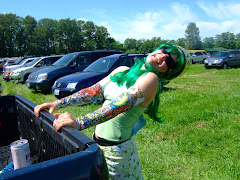
-Ralph Waldo Emerson.
Yesterday concluded my week of spring vacation, and despite the incessant rain and the fact that I was trapped inside for days on end, it was nevertheless great having free time. Nine days--216 hours--which I didn't completely waste on naps.
I managed, despite being housebound, to spend some quality time playing. In my world, this meant doing craft projects, painting furniture I bought off Craigslist, reading,goofing around with Frida, and riding my bike before the rubber on the tires decays from lack of use.
The good news is that time spent playing is not squandered, according to researchers. In Play: How it Shapes the Brain, Opens the Imagination, and Invigorates the Soul, Stuart Brown, M.D. shares a plethora of anecdotal and scientific research indicating that not only is play important, it is absolutely vital for the health and development of the brain. And the data applies not just to children, but to adults as well. "Play...seems to continue the process of neural evolution...it promotes the creation of new connections that didn't exist before...play seems to be one of the most advanced methods nature has invented to allow a complex brain to create itself." Even if you're not interested in getting any smarter, you might be inclined to play for the health benefits. "People who continue to play games are less likely to get heart disease and other afflictions that seem to have nothing to do with the brain," Brown writes.
 He devotes a significant portion of the book to the play we're most familiar with--the stuff kids do when their parents tell them to go outside. Unfortunately, he notes, unstructured playtime has become more rare, usurped by scheduled playdates, organized sports teams, assorted lessons, and other activities planned by adults. The quest for improved standardized test scores in schools also forces cut-backs in the arts, P.E., and music, something Brown says is "the wrong approach" for many reasons. "Play isn't the enemy of learning," Brown writes. "It's learning's partner. Play is like fertilizer for brain growth. It's crazy not to use it." In addition, today's students will face a work world required more ingenuity and creativity than ever before--thinking skills best developed in unstructured, imaginative play and exploratory music and art classes.
He devotes a significant portion of the book to the play we're most familiar with--the stuff kids do when their parents tell them to go outside. Unfortunately, he notes, unstructured playtime has become more rare, usurped by scheduled playdates, organized sports teams, assorted lessons, and other activities planned by adults. The quest for improved standardized test scores in schools also forces cut-backs in the arts, P.E., and music, something Brown says is "the wrong approach" for many reasons. "Play isn't the enemy of learning," Brown writes. "It's learning's partner. Play is like fertilizer for brain growth. It's crazy not to use it." In addition, today's students will face a work world required more ingenuity and creativity than ever before--thinking skills best developed in unstructured, imaginative play and exploratory music and art classes.Adults, too, have to give themselves permission to play. We've been led to believe that playing or goofing off is a waste of time, but the opposite is true--in all arenas. Not only do studies show that adults
 who play stave off dementia and other health issues, they're also happier (duh) and better employees. "Employees who have engaged in play throughout their lives outside of work and bring that emotion to the office are able to do well at work-related tasks that might seem to have no connection to work at all," Brown says. "Respecting our biological need for play can bring back excitement and newness to the job. Play helps us deal with difficulties, provides a sense of expansiveness, promotes mastery of our craft, and is an essential part of the creative process...work does not work without play." So all the practical jokes we execute at work? Not just harmess pranks. They're brain builders. Remember that the next time someone covers your car windows with Post-it notes.
who play stave off dementia and other health issues, they're also happier (duh) and better employees. "Employees who have engaged in play throughout their lives outside of work and bring that emotion to the office are able to do well at work-related tasks that might seem to have no connection to work at all," Brown says. "Respecting our biological need for play can bring back excitement and newness to the job. Play helps us deal with difficulties, provides a sense of expansiveness, promotes mastery of our craft, and is an essential part of the creative process...work does not work without play." So all the practical jokes we execute at work? Not just harmess pranks. They're brain builders. Remember that the next time someone covers your car windows with Post-it notes. Despite the weather (which is beautiful, of course, now that I'm back at work), I played as much as I could last week: hung with my aging buddy Kosha, took Frida to the dog park, biked with Laural and my roommate, played Scrabbled, hot-tubbed, and watched another 47 (or so) episodes of Rescue Me; I did some yardening, read, napped, visited my nephew, family, and friends, went on the Downtown Gallery Walk, made it to the gym a few times, and basically pursued my usualness with freedom and frivolity. Yes, the weather sucks a lot of the time, chores have to be done, and therenever seems to be enough energy/money/time. But whatever you do, if If you're laughing, you're playing. And I don't know what's any better than that.








